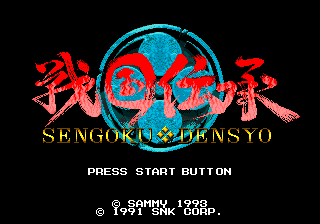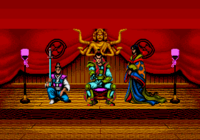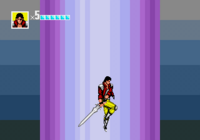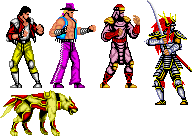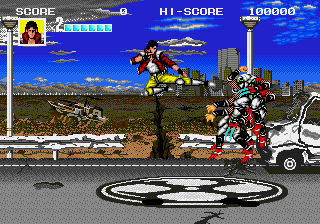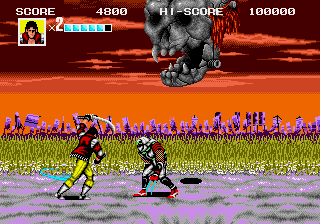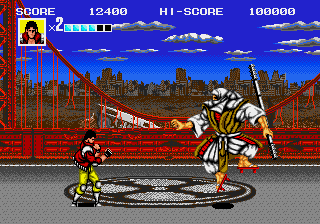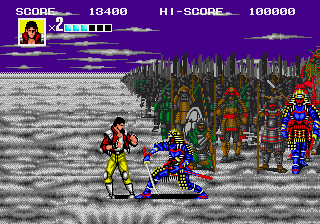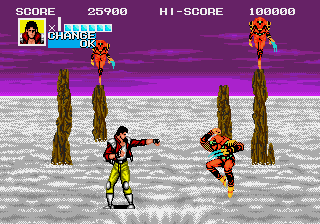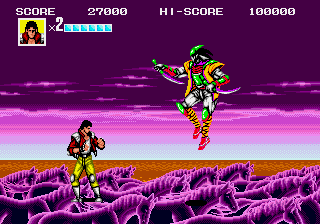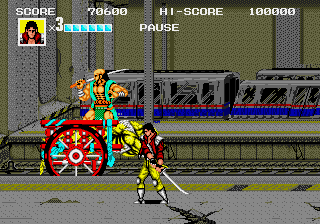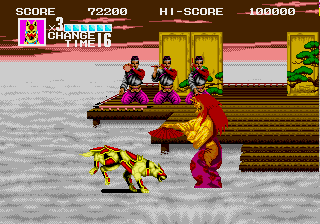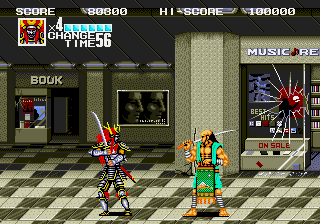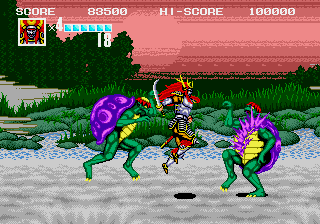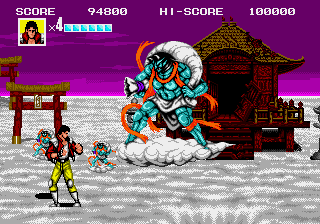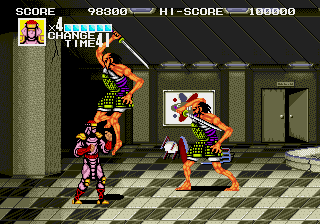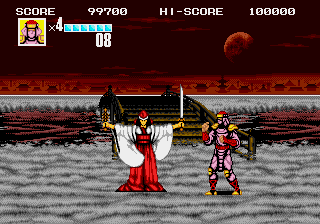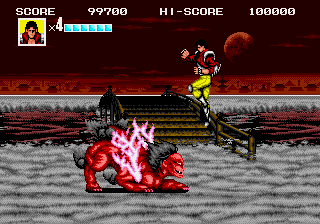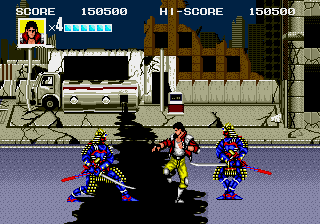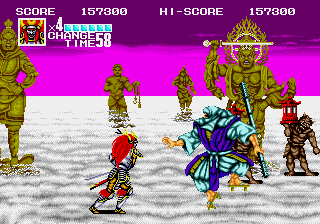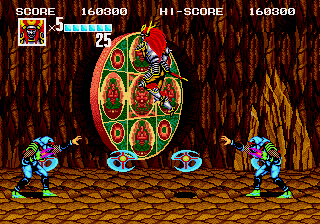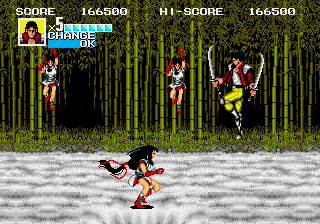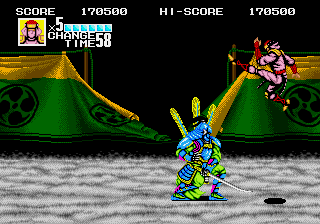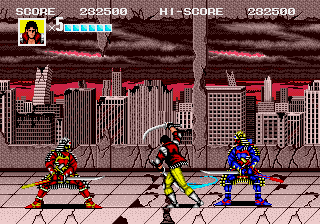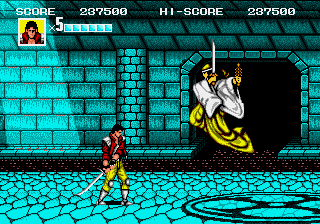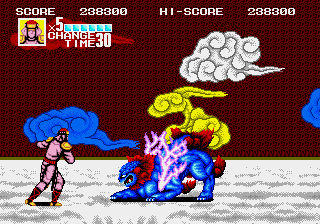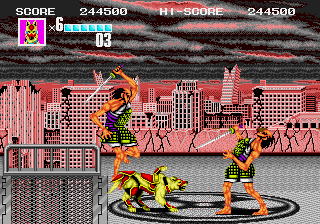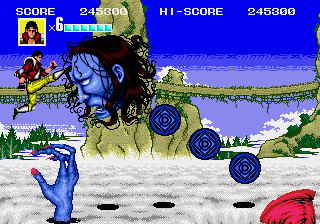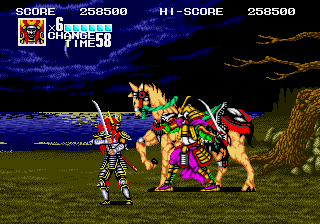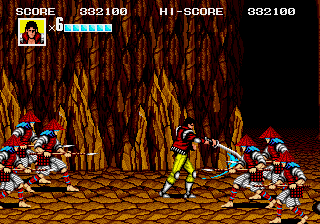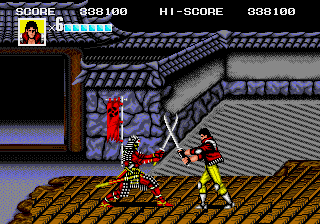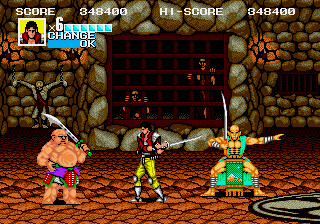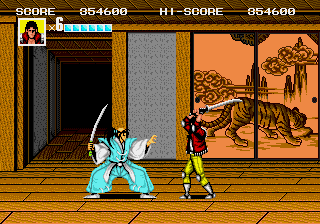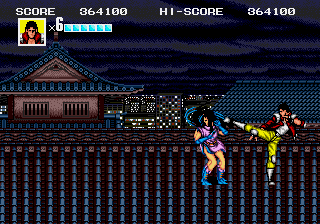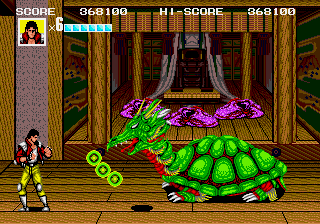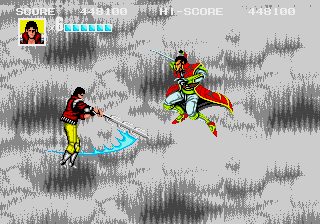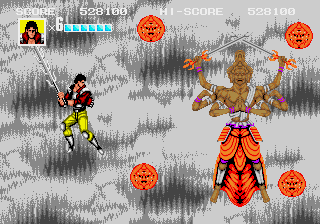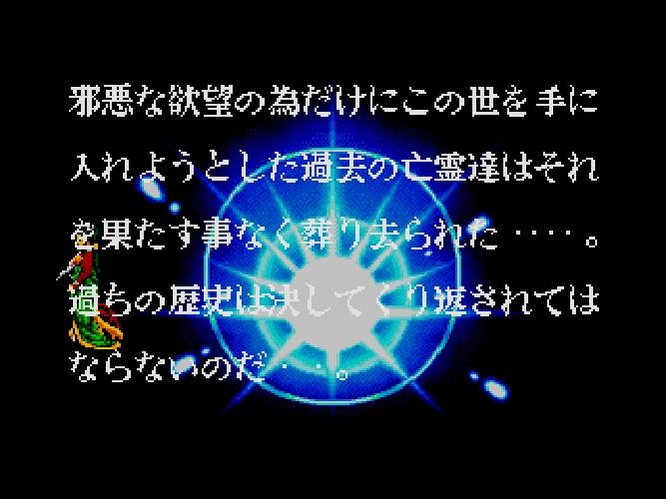Sengoku Denshou
From Sega Retro
| Sengoku Denshou | ||||||||||
|---|---|---|---|---|---|---|---|---|---|---|
| System(s): Sega Mega-CD | ||||||||||
| Publisher: Sammy | ||||||||||
| Developer: Dragnet, Kan's, SNK | ||||||||||
| Licensor: Sammy, SNK | ||||||||||
| Original system(s): Neo Geo | ||||||||||
| Genre: Action[1][2] | ||||||||||
| Number of players: 1 | ||||||||||
| ||||||||||
|
Sengoku Denshou (戦国伝承) is a beat-'em-up released for the Sega Mega-CD exclusively in Japan in 1993. It is based on a 1991 arcade game by SNK.
Contents
Story
Centuries ago, a cruel and tyrannical warlord was defeated by the two elite samurai, but it swore to return in the future. He returns in the modern world, and he brings with him a legion of undead feudal Japanese warriors. The warlord is opposed only by the two protagonists, who turn out to be descendants of the two elite Samurai responsible for vanquishing the wicked warlord centuries ago.
Gameplay
The game is a belt-scrolling beat-'em-up that can be played by a single player. The player can choose between two characters who play the same but look different. The characters attack by punching and kicking, but some enemies drop orbs that arm the characters with swords or magical attacks for a limited time. When certain enemies are defeated, they leave behind their warrior spirits, which enable the characters to temporarily transform into different forms: a ninja, a samurai, and an armor-clad wolf. These forms are affected by the power-up orbs in different ways. Stages take place in the modern world, but characters are occasionally warped to an alternate dimension resembling feudal Japan. Here, the characters fight a boss and avenge the slain townsfolk, and in return, a spirit imbues them with a temporary magic attack.
The character moves in any direction using the D-Pad and jumps with ![]() . The character attacks with
. The character attacks with ![]() , which can be done while airborne for a jumping kick. When fighting with swords, the character's sword may become crossed with that of a foe; the player must rapidly press
, which can be done while airborne for a jumping kick. When fighting with swords, the character's sword may become crossed with that of a foe; the player must rapidly press ![]() to overcome the enemy's sword (or otherwise take damage).
to overcome the enemy's sword (or otherwise take damage).
When other forms have been collected, the character can switch between them with ![]() . The spirit appears above the character; if the player has collected multiple spirits, it can be changed with
. The spirit appears above the character; if the player has collected multiple spirits, it can be changed with ![]() or
or ![]() . The selected form can be chosen with
. The selected form can be chosen with ![]() or
or ![]() (or canceled by pressing
(or canceled by pressing ![]() again). The forms last 60 seconds, but the player can change back to the character's regular form through the same means. Once a form is used, the spirit is no longer available until it is found from another enemy.
again). The forms last 60 seconds, but the player can change back to the character's regular form through the same means. Once a form is used, the spirit is no longer available until it is found from another enemy.
The character has a health bar with six segments and loses a segment each time he is harmed by an enemy. The different forms share the same health. The character loses a life when all health points are lost but respawns in the same spot if the player has extra lives left. The game ends if the player runs out of lives, but it can be continued as long as there are credits remaining. Extra lives are awarded at 40,000 and 80,000 points and then every 80,000 points after that. There are three difficulty levels (Easy, Normal, and Hard).
Forms
Orbs
Orbs are sometimes dropped by defeated foes.
| Green Orb | |
|---|---|
| Collect 5 Green Orbs to restore one health point. | |
| Red, Cyan, Violet, and Yellow Orbs | |
| Arms the character with a special weapon for a duration. |
Stages
| Stage 1 | |
|---|---|
| Stage 2 | |
| Stage 3 | |
| Stage 4 | |
| Stage 5 | |
Production credits
- Produce: Minoru Suzuki
- Program: Takanori Kohno, Masaharu Ohno
- Sound: Tate Norio, Shimizum, Yoshikazu Yao
- Picture: U‑Rakuchou, Marohie, Mic-Senbey, Chulip‑Nao, Dadamusi, Sick Of, Kyoko Tachibana, Sadamon, Yoshiyuki Iguchi
- Game Assist: Ryo Saito, Hiroshi Takenaka, Yasuhisa Itoi
- Direct: Masaharu Ohno
- Presented by: Sammy
Magazine articles
- Main article: Sengoku Denshou/Magazine articles.
Physical scans
| Sega Retro Average | ||||||||||||||||||||||||
|---|---|---|---|---|---|---|---|---|---|---|---|---|---|---|---|---|---|---|---|---|---|---|---|---|
|
| 53 | |
|---|---|
| Based on 4 reviews | |
Technical information
- Main article: Sengoku Denshou/Technical information.
References
- ↑ File:SengokuDenshou MCD JP Box Back.jpg
- ↑ 2.0 2.1 https://sega.jp/fb/segahard/mcd/soft_licensee.html (Wayback Machine: 2019-06-10 17:56)
- ↑ File:SengokuDenshou MCD JP SSCredits.pdf
- ↑ Beep! MegaDrive, "February 1994" (JP; 1994-01-08), page 21
- ↑ Famitsu, "1994-01-07,14" (JP; 1993-12-24), page 1
- ↑ Hippon Super, "January 1994" (JP; 1993-12-03), page 41
- ↑ Sega Saturn Magazine, "September 1995" (JP; 1995-08-08), page 85
| Sengoku Denshou | |
|---|---|
|
Main page | Magazine articles | Reception | Technical information | |
